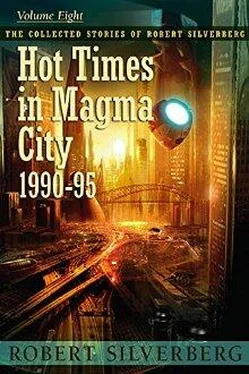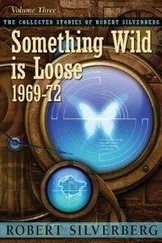Robert Silverberg - The Red Blaze is the Morning
Здесь есть возможность читать онлайн «Robert Silverberg - The Red Blaze is the Morning» весь текст электронной книги совершенно бесплатно (целиком полную версию без сокращений). В некоторых случаях можно слушать аудио, скачать через торрент в формате fb2 и присутствует краткое содержание. Год выпуска: 2014, ISBN: 2014, Издательство: Subterranean Press, Жанр: Фантастика и фэнтези, на английском языке. Описание произведения, (предисловие) а так же отзывы посетителей доступны на портале библиотеки ЛибКат.
- Название:The Red Blaze is the Morning
- Автор:
- Издательство:Subterranean Press
- Жанр:
- Год:2014
- ISBN:978-1-59606-705-9
- Рейтинг книги:3 / 5. Голосов: 1
-
Избранное:Добавить в избранное
- Отзывы:
-
Ваша оценка:
- 60
- 1
- 2
- 3
- 4
- 5
The Red Blaze is the Morning: краткое содержание, описание и аннотация
Предлагаем к чтению аннотацию, описание, краткое содержание или предисловие (зависит от того, что написал сам автор книги «The Red Blaze is the Morning»). Если вы не нашли необходимую информацию о книге — напишите в комментариях, мы постараемся отыскать её.
The Red Blaze is the Morning — читать онлайн бесплатно полную книгу (весь текст) целиком
Ниже представлен текст книги, разбитый по страницам. Система сохранения места последней прочитанной страницы, позволяет с удобством читать онлайн бесплатно книгу «The Red Blaze is the Morning», без необходимости каждый раз заново искать на чём Вы остановились. Поставьте закладку, и сможете в любой момент перейти на страницу, на которой закончили чтение.
Интервал:
Закладка:
The Red Blaze is the Morning
by Robert Silverberg
The Red—Blaze—is the Morning—
The Violet—is Noon—
The Yellow—Day—is falling—
And after that—is none—
Day by blazing day Halvorsen stretches himself across a blistering abyss, patiently searching in recalcitrant rock and hot sand for morsels of the useless past, even though he has begun to doubt the meaning and value of his own work. By chilly night, soaking his damaged and aching leg in a shallow basin of tepid sea-water—in this arid part of Turkey, fresh water is a luxury—he feels seductive fingers tickling the membranes of his mind. Something is trying to get in: perhaps already has. Something keeps nestling down alongside his consciousness and whispering fantastic, tempting things to him, visions of far-off times, mighty civilizations yet unborn. Or so it often seems.
What is actually going on, Halvorsen suspects, is that he is beginning to go crazy. The fascination of what’s difficult, he thinks, has not merely dried the sap out of his veins, as old Yeats feared it would, but has parched his brain beyond the bounds of sanity. And yet he can still speak six languages, including Turkish and Hebrew and modern Greek, and he can read Latin and classical Greek besides. He can recite the names of the Roman emperors from Augustus to Romulus Augustulus without missing one. Yes, his mind still functions well enough. Something else, something equally intangible and even harder to define, is what has become impaired. And then there is the sore leg, too, which mended inadequately after last summer’s accident on the rocky slope and is painful all the time. The leg is really in very bad shape. He ought not to be out here on the summit of the hill with a pick and shovel. He should be sitting in his tent, supervising the work of others. But Halvorsen has always been a hands-on kind of archaeologist: a point of great pride for him.
This is the fifth week of the third season of the dig. It is high summer, when the blue cloudless sky reflects the light of the swollen sun like a hot metal plate, and the meltem , the dry, hot, unrelenting wind out of the inland plateau, sends 50-mile-an-hour blasts of brown dust into your nostrils and eyes and mouth and every cranny of your clothing for four or five days without halting. Halvorsen’s site is on a ragged little peninsula in southwest Turkey, overlooking the Mediterranean coast. It is an unimportant place that does not even have a paved road running to it, nor running water or electricity, and yet it has a long history. There is a tiny fishing village here now; before that, there was a Byzantine naval base; before that, Romans; before them, a Greek trading outpost; before that, a Minoan trading outpost; before that, Halvorsen thinks, a proto-Hittite encampment. And before that—ah, nobody knows what was here before that. But Halvorsen has a hypothesis, based on a few scattered and questionable bits of evidence. For three summers, now, he has been trying to find more satisfactory proof to support that hypothesis.
At mid-morning on this blazingly hot day Halvorsen is working alone on high, extending the trench that runs along the proto-Hittite side of the hill. Nobody he knows believes that the Hittites ever lived here, or anywhere else along this coast; and he himself has nothing to go by in that direction except the presence at the highest point of the site of a double line of mud-brick walls, two courses high, that feel more or less Hittite to him. But he is not particularly concerned with the Hittites, anyway: they are a Bronze Age folk, and he is looking for something much more ancient. Still, it would be helpful to prove that the Hittites had passed this way too. And this is his dig. He can call this wall proto-Hittite if he feels like it, at least for the time being.
The site where he is working is a difficult one, steep and precarious. A rainstorm of unprecedented ferocity for this dry coast, six winters back, had carved away half the western face of the hill, laying bare the very finds that had brought Halvorsen here in the first place; but the angle of the lie is practically vertical, the soil crumbles easily, and Halvorsen’s budget will not allow him to put proper bridging across the worst of the gaps. So he hobbles around up here, walking lopsided as it is because of his torn-up leg, testing the ground as he goes in order to make sure it will bear his weight, and fearing at every moment that he will hit a weak spot and go tumbling down in a black cloud to land on the fanged rocks below.
He knows that he ought to be letting his Turks extend this trench for him. But he feels that he is on the brink of a major discovery. How would the workmen be able to detect the place where the terrain changes, and the proto-Hittite stratum gives way to an even older one?
“They’ll know,” Jane Sparmann says. She’s the graduate student from Columbia who has been working with him out here for three years, now. “They may be illiterate laborers, but they’ve spent their whole lives digging in these mounds and they have a sixth sense about any kind of shift in the matrix.”
“Even so,” Halverson has replied whenever this comes up. “I want to do this myself. I have a seventh sense.”
Sparmann laughs. Halvorsen knows that she thinks he is stubborn to the point of irrationality. Very likely Sparmann believes that too many summers under the Mediterranean sun have addled his brain, grand old figure of the field that he is. Well, so be it: she’s probably right. But he intends to do his own digging up here, even so. Moving slowly along the stone base of the mud wall, looking for the precise spot at the end of the proto-Hittite wall where the soil darkens into virginity and then the place just beyond it where, he hopes, the Neolithic occupants of this site had erected their primordial acropolis.
It’s a fine place for an acropolis. No enemies can come upon you unaware, if you have watchmen posted up here. The hill runs athwart the peninsula for five hundred meters, a sharp rocky ridge. Look to the west and you see the smooth blue sea. To the east, you have a long view of the baking dusty plain.
Halvorsen pokes with his pick, scrapes, peers, brushes the dirt aside, pokes again. Nothing. It’s dull work, but he’s used to it. Steady toil, unrelieved boredom, sweat and dust, one clump of dirt and rock after another, poke and sift, move along. He thinks enviously of Schliemann unearthing rooms of golden treasure, Howard Carter shining his flashlight beam into the tomb of Tut-ankh-Amen. But of course they had put in their months and years of dusty boredom too.
“Mudur Bey!” calls a loud rasping voice from below. “Mudur Bey!” His title: “Mr. Director.” The Turks can’t or won’t learn to pronounce his name. With difficulty Halvorsen levers himself upright, leaning on his shovel, and peers down the eastern slope of the hill to the place where Sparmann and three of the diggers are working, over at the edge of the Greek settlement. Ibrahim, his foreman, is standing in the trench, triumphantly holding up a crude buff-colored pot.
“What is it?” Halvorsen asks.
Jane Sparmann, at Ibrahim’s elbow, cups her hand and calls, “It’s full of coins! Athenian owls, some Corinthians, something from Syracuse.”
“Fine,” Halvorsen says, without enthusiasm. “Give him his bonus.”
“You don’t want to see them?”
“Later,” he says.
They always pay the diggers extra for any easily marketable artifacts, to keep them from taking them on their own behalf. The expense is trivial, a hundred liras per coin. Sparmann is excited by the find—she’s still young—but to Halvorsen the coins, and indeed the whole Greek settlement, are merely an irritating distraction. Dozens of Greek coins turn up wherever you put a spade in the ground. As for the stumps of a little temple, the hazy outlines of a marketplace: who cares? The Mediterranean world is full of Greek temples. They bring no news. Halvorsen is looking beneath such things, beyond, behind, searching for the secret from which all this Mediterranean splendor sprang. The unknown progenitor-race, the pivot, the fulcrum on which the magnificence turned as it began the centrifugal outreach of its grandeur.
Читать дальшеИнтервал:
Закладка:
Похожие книги на «The Red Blaze is the Morning»
Представляем Вашему вниманию похожие книги на «The Red Blaze is the Morning» списком для выбора. Мы отобрали схожую по названию и смыслу литературу в надежде предоставить читателям больше вариантов отыскать новые, интересные, ещё непрочитанные произведения.
Обсуждение, отзывы о книге «The Red Blaze is the Morning» и просто собственные мнения читателей. Оставьте ваши комментарии, напишите, что Вы думаете о произведении, его смысле или главных героях. Укажите что конкретно понравилось, а что нет, и почему Вы так считаете.












